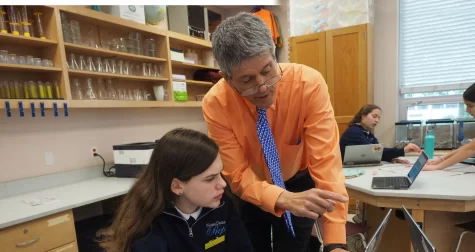Review of Inherit the Wind at Loyola Blakefield

November 5, 2014
The Loyola Blakefield Players tell the story of one courtroom teeming with tempestuous arguments, shouts of consolation and rage from an impassioned group of onlookers, controversial claims, and a budding Romeo and Juliet-esque romance in their production of “Inherit the Wind.”
Depicting the 1925 Scopes v. Monkey Trial, in which a school teacher is convicted of teaching evolutionism in schools during a time when only creationism was acceptable, the play explores the infamous controversy and the town of Hillsboro’s inherent turmoil. This play was written by Jerome Lawrence and Robert E. Lee.
The production was, in many ways, defined by the trial itself. Line after line of pure infuriation and zeal intensified the already heightened scene of the courtroom and showcased the two awe-inspiring actors, playing the antithetical attorneys Henry Drummond and Matthew Harrison Brady, Zachary Phillips and Matthew Demetrides. The chemistry between these two performers was sensational. Developing their characters impeccably through signature accents, body language, and other mannerisms, Phillips and Demitrides brought forth two distinct characters that meshed dynamically when sharing the stage as prominent characters.
Patrick Gagliardi (E.K. Hornbeck) created a perfectly sardonic and farcical critic with simple but powerful movements and cynical tones that conveyed a hilariously sarcastic character, adding to the play notably. The mayor of Hillsboro, played by Peter Pferdeort brought a charmingly clueless essence to the stage, exuding comic ability as well as a commendable energy and presence. Also maintaining a particularly impressive energy throughout the show, the townspeople depicted tremendously a spirited group of ordinary citizens, creating a particular expressive and energetic scene in which they responded to Reverend Jeremiah Brown (Nicholas Kolasny) as he led them in an animated chant that led the ensemble into the next scene with a profound new energy, visible on stage.
The technological aspects of the production were also creditable, the set was utilized in an effective way, conveying different locations by using different levels. Set changes were accompanied by the strumming of an acoustic guitar, a creative choice that emphasized the sleepiness of a small American town.
This production truly found a balance between the harsh opinions paired with the significant religion in schools controversy and telling a story of friendship, love, and family, all while showcasing the remarkable talents of the Loyola Blakefield Players.
by Devon Burke of Annapolis






